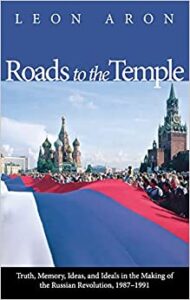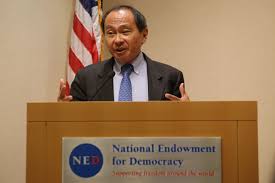Moscow’s aim in Ukraine continues to be that of “eliminating anti-Russian elements” and eventually imposing a “Chechen solution” on the country, a former Russian colleague tells Nathalie Tocci, Director of the Istituto Affari Internazionali, and a former advisor to the EU’s foreign policy chief.
When I asked him whether Moscow still believed this was feasible, he wavered only slightly, she writes for Prospect:
Yes, he conceded, those “anti-Russian elements” may be more numerous than anticipated, making the establishment of a pro-Russian regime in Ukraine—the Chechen solution—neither easy nor immediate. But, he said, Russia could simply not afford to lose this war. If it did, the Russian state could implode.
 Why have Russia and Ukraine followed such different political paths? asks Leon Aron, a senior fellow at the American Enterprise Institute and the author, most recently, of “Roads to the Temple: Truth, Memory, Ideas and Ideals in the Russian Revolution, 1987-1991.”
Why have Russia and Ukraine followed such different political paths? asks Leon Aron, a senior fellow at the American Enterprise Institute and the author, most recently, of “Roads to the Temple: Truth, Memory, Ideas and Ideals in the Russian Revolution, 1987-1991.”
A large part of the answer has to do with how the Russian and Ukrainian governments responded to the rise of oligarchs, he writes for The Wall Street Journal. In both countries, a small number of robber barons amassed enormous wealth and power after 1991 by taking control of state assets and the media, allowing them to establish centers of authority independent of the executive.
Unlike oligarchs in Ukraine, who have had to vie for political influence, the reclusive billionaire, party boss, and kingmaker Bidzina Ivanishvili has had little competition in Georgia, allowing him to buy votes and gradually put his followers in positions of power in the legislature, courts, and executive branch, Francis Fukuyama and Nino Evgenidze write for Foreign Affairs:
As with the ruling parties in Hungary and Russia, Georgian Dream has used these institutions to keep and expand its power through successive elections. It has also used this control to strengthen ties with Moscow. To loosen Russia’s hold over Georgia, the United States and its allies should support Georgia’s democratic opposition and take action against Ivanishvili and any Georgian companies that are helping Russia evade sanctions. It is time for the United States and its allies to sanction members of Georgia’s government.

Former NED board member Francis Fukuyama
Russia may be on the back foot in Ukraine, but it is winning in Georgia, Fukuyama and Evgenidze assert. This time, their warnings must be heard, unless the West is prepared to let Russia fully capture this deeply threatened democracy.
The question is whether Ukrainian civil society will prove mature enough to replace the oligarchs, Aron adds:
Alexander Gabuev, a top Russian political analyst, has observed that thanks to the independence of the oligarchs, “coalitions of powerful players were constantly reassembling…to prevent the emergence of someone like Putin” in Ukraine. It is very unlikely that after three decades Ukraine would imitate Russian-style authoritarianism. Still, wars endanger civil and political liberties even in mature republics, and Mr. Zelensky’s status as a war hero multiplies the usual temptations of unlimited power.
The Ukraine war has crystallized a contradiction, Tocci asserts:
 On the one hand, the west has united in response to Russian aggression and proved that, when it sticks together, it is a force to be reckoned with; on the other, the war has been a reminder that the world does not revolve around us.
On the one hand, the west has united in response to Russian aggression and proved that, when it sticks together, it is a force to be reckoned with; on the other, the war has been a reminder that the world does not revolve around us.
Most countries, while not siding with Russia, have equally preferred not to put all their eggs in the western basket. Some, like Turkey, the Arab Gulf states or India have hedged, extracting value from sitting on the fence. Most countries in Africa, Asia and Latin America don’t share Ukraine and the west’s preoccupations with the war; they simply have other priorities in mind. We already live in a non-polar world. RTWT
With two thirds of the world’s population residing in countries that have not signed on to pro-active sanctions against Russia, is the democracy versus authoritarian framing the most effective one? the Carnegie Endowment asks.
 Why isn’t the United States and much of the West’s message getting though? Why are so many nations hedging? And what are the prospects for a resurgence of democratic systems against the backdrop of recent democratic backsliding? What concrete steps can the U.S. and its democratic allies take to support fledgling and fragile democracies?
Why isn’t the United States and much of the West’s message getting though? Why are so many nations hedging? And what are the prospects for a resurgence of democratic systems against the backdrop of recent democratic backsliding? What concrete steps can the U.S. and its democratic allies take to support fledgling and fragile democracies?
Aaron David Miller sits down with Atlantic staff writer and author Anne Applebaum to discuss the struggle for democracy and the war in Ukraine. April 14, 2023.10:00 AM—10:45 AM EDT (UTC-4). RSVP
Can #Ukraine‘s civil society replace its #oligarchs? @AEI‘s #LeonAron asks in @WSJ. Thanks to the oligarchs’ independence, “coalitions of powerful players were constantly reassembling…to prevent the emergence of someone like Putin” @AlexGabuev observed. https://t.co/6GldUlZ7UK
— Democracy Digest (@demdigest) April 6, 2023







